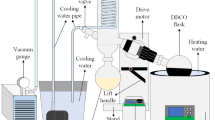Abstract
In this article, hydroprocessing of non-edible Mesua ferrea L. (MFL) seed oil has been described for the first time with a perspective for the production of liquid biofuels identical to petroleum products. MFL seed oil was hydroprocessed at the constant temperature of 400 °C under 7.5 MPa initial H2 pressure in a 2L capacity batch reactor for 4 h using 0.1 % Na2CO3 as catalyst. About 90 wt% biocrude could be obtained after hydroprocessing while the balance 7 % escapes as non-condensable gases and 2–3 % water at the bottom of the collecting flask. The resultant biocrude was characterized with regard to appropriate standards and distilled as per ASTM D2892 and ASTM D5236 using the TBP distillation unit. The distillate fractions obtained were characterized and it was found that the petroleum fraction within the boiling range of 35–140 °C was 15 wt%, kerosene and aviation fuel within the boiling range of 140–300 °C were 22 wt%, while the diesel fraction in the range of 300–370 °C was 14 wt%. About 11 wt% slightly yellowish coloured paraffin wax could also be recovered from the biocrude. Thus, the total recoverable distillates are 62 wt% of the original biocrude. The fuel properties of the different fractions were determined as per ASTM standard and were found to be in conformity to petroleum distillates. The economic analysis of the process and product unveil that the cost of biocrude and distillate is primarily dependent upon the cost of raw MFL seed oil. If the MFL can be availed @ INR 15/L then the prevailing costs of petroleum distillates and biocrude distillates have no difference at all.






Similar content being viewed by others
References
Aatola H, Larmi M, Sarjovaara T, Mikkonen S (2008) Hydrotreated vegetable oil (HVO) as a renewable diesel fuel: trade-off between NOx, particulate emission, and fuel consumption of a heavy duty engine. SAE Technical Paper 2008-01-2500:12
Abbasi S, Diwekar Urmila M (2014) Characterization and stochastic modeling of uncertainties in the biodiesel production. Clean Technol Environ Policy 16:79–94
Bezergianni S, Dimitriadis A (2013) Temperature effect on co-hydroprocessing of heavy gas oil—waste cooking oil mixtures for hybrid diesel production. Fuel 103:579–584
Calore P. What is the profit-margin for refining crude oil into gasoline. http://business.whatitcosts.com/refine-oil-pg3.htm. Accessed 18 April 2014
Guzman A, Torres JE, Prada LP, Nunez ML (2010) Hydroprocessing of crude palm oil at pilot plant scale. Catal Today 156:38–43
Hancsok J, Eller Z, Polczmann G, Varga Z, Hollo A, Varga G (2014) Sustainable production of bioparaffins in a crude oil refinery. Clean Technol Environ Policy. doi:10.1007/s10098-014-0743-6
Kubatova A, Luo Y, Stavova J, Sadrameli SM, Aulich T, Kozliak E, Seames W (2011) New path in the thermal cracking of triacylglycerols (canola and soybean oil). Fuel 90(8):2598–2608
Marousek J (2014) Novel technique to enhance the disintegration effect of the pressure waves on oilseeds. Ind Crops Prod 53:1–5
Marousek J, Itoh S, Higa O, Kondo Y, Ueno M, Suwa R, Tominaga J, Kawamitsu Y (2013) Enzymatic hydrolysis enhanced by pressure shockwaves opening new possibilities in Jatropha Curcas L. processing. J Chem Technol Biotechnol 88(9):1650–1653
No S-Y (2014) Application of hydrotreated vegetable oil from triglyceride based biomass to CI engines—A review. Fuel 115:88–96
Onyestyak G, Harnos S, Szegedi A, Kallo D (2012) Sunflower oil to green diesel over Raney-type Ni-catalyst. Fuel 102:282–288
Pinto F, Martins S, Gonçalves M, Costa P, Gulyurtlu I, Alves A, Mendes B (2013) Hydrogenation of rapeseed oil for production of liquid bio-chemicals. Appl Energy 102:272–282
Rong L, Liu J, Fan K, Tian W, Liu C (2012) Hydroprocessing of Jatropha oil over NiMoCe/Al2O3 catalyst. Int J Hydrogen Energy 37(23):17731–17737
Sarma AK, Konwer D (2005) Feasibility studies for conventional refinery distillation with a (1:1) w/w of a biocrude blend with petroleum crude oil. Energy Fuels 66(9):1755–1758
Satyarthi JK, Chiranjeevi T, Gokak DT, Viswanathan PS (2013) An overview of catalytic conversion of vegetable oils/fats into middle distillates. Catal Sci Technol 3:70–80
Schneider RCS, Lara LRS, Ceolin MM, Kaercher JA, Schneider M (2013) Environmental impact of castor oil catalytic transfer hydrogenation. Clean Technol Environ Policy 15:977–985
Sebos I, Matsoukas A, Apostolopoulos V, Papayannakos N (2009) Catalytic hydroprocessing of cottonseed oil in petroleum diesel mixtures for production of renewable diesel. Fuel 88(1):145–149
Sharma RK, Anand M, Rana BS, Kumar R, Farooqui SA, Sibi MG, Sinha AK (2012) Jatropha-oil conversion to liquid hydrocarbon fuels using mesoporous titanosilicate supported sulfide catalysts. Catal Today 198(1):314–320
Simacek P, Kubicka D, Sebor G, Pospisil M (2010) Fuel properties of hydroprocessed rapeseed oil. Fuel 89(3):611–615
Toth C, Baladincz P, Kovacs S, Hancsok J (2011) Producing clean diesel fuel by co-hydrogenation of vegetable oil with gas oil. Clean Technol Environ Policy 13:581–585
Veriansyah B, Han JY, Kim SK, Hong SA, Kim YJ, Lim JS, Kim J (2012) Production of renewable diesel by hydroprocessing of soybean oil: effect of catalysts. Fuel 94:578–585
Weber B, Stadlbauer E, Stengl S, Hossain M, Frank A, Steffens D, Schlich E, Schilling G (2012) Production of hydrocarbons from fatty acids and animal fat in the presence of water and sodium carbonate: reactor performance and fuel properties. Fuel 94:262–269
Acknowledgments
The authors acknowledge with thanks the financial grants received from the Ministry of New and Renewable Energy, Government of India, vide sanction F No 7/152/2010-BF dt. 13/09/2011 to carry out this work.
Author information
Authors and Affiliations
Corresponding author
Rights and permissions
About this article
Cite this article
Aslam, M., Kothiyal, N.C. & Sarma, A.K. True boiling point distillation and product quality assessment of biocrude obtained from Mesua ferrea L. seed oil via hydroprocessing. Clean Techn Environ Policy 17, 175–185 (2015). https://doi.org/10.1007/s10098-014-0774-z
Received:
Accepted:
Published:
Issue Date:
DOI: https://doi.org/10.1007/s10098-014-0774-z




